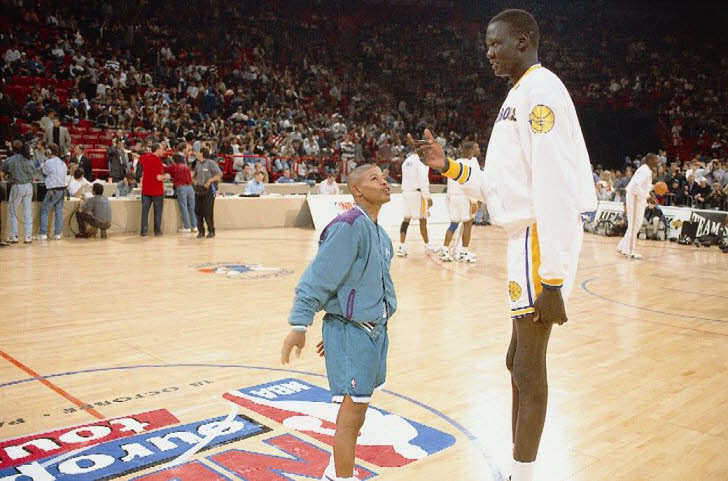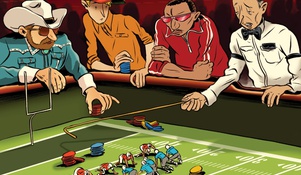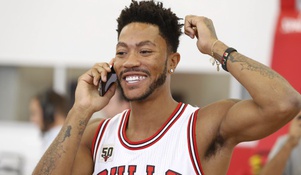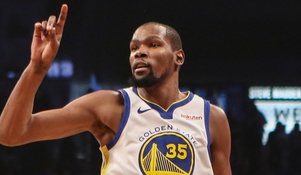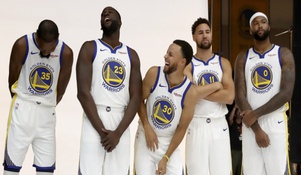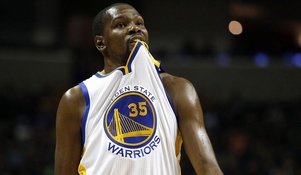A GSW championship is a victory for the 'new NBA', but is it here to stay?
An NBA season with no real favorites, wide open races, dominance of one conference while the other's dominated by one player, relative newbies in the MVP race, rookie head coaches leading formidable campaigns, and finally best team vs best player in the finals - all left me confusingly brainstorming a plethora of interesting topics while struggling to pinpoint what exactly the conclusions from this year should be.
Lebron took a bunch of bums to the Finals. That's not supposed to happen. It was a sad realization to know that we spend so much time obsessing over a game that can be so blatantly dominated by one man. Also, I don't think they were the best team in the East. I know results trump everything but my pre-playoff picks of the Clippers and Bulls actually had their respective series won, if they went about their business with the cool and professionalism of champion contenders. Then after all that, it seemed like the almighty Warriors of the regular season coasted through the post season or at least never came close to playing their best. That's not supposed to happen. They beat the seemingly omnipotent West while Curry, for the first time ever, beat all the other members of the All-NBA First Team en route to his title – and again – all this while performing nowhere near the levels of best Warriors basketball of the season. And remember how we all said that the key to the Warriors success is Bogut's health? They just sat his ass down for the Finals – and they still won!
That last observation brings me to the notion that may be the basis for most interesting and concrete questions of this NBA season. If we were to build a championship recipe based solely on this season we'd be forced into a conclusion that the number one ingredient for success is depth. It takes precedence over 3 point shooting which admittedly played a huge role in getting them the number 1 spot, but they never quite reached the light-out levels in the playoffs. But shooting surely has to be next on the list, though, I admit, it's hard to draft the best shooting backcourt in NBA history, but it may mean trading for guys like JJ Redick or Bradley Beal. Thirdly, small ball can beat tall ball when you do have such shooters. And lastly, no matter how badly Charles Barley wants to deny it, analytics are a part of the game now. The good teams calculate everything. They know from what spot on the floor, what guy, shoots what percentage, with which hand, after what number of dribbles. Then they convey this knowledge to the players – who obey. Just watch a Rockets game and look for anybody other than games Harden to take a long two-pointer.
All this lead to a discussion of a “new NBA” - one in which guardplay dominates, teams run 80 pick-n-rolls a game, speed trumps size, and threes are the superior strategy because of sheer mathematics. One which is dominated by analytics, computer systems, and advanced metrics, in which every in depth conversation about the game of basketball must include a series of strange acronyms and one in which Phil Jackson proves to be a dinosaur. Phil, a long-time proponent of old-school basketball and a domineering imposer of the triangle offense on his sorry Knicks, took to Twitter when GSW were down 2-1 to the nitty-gritty Memphis and mockingly questioned the new-schoolers by asking for their thoughts about the effectiveness of the 3 point shot in the playoffs at that point. They quickly responded that the eight remaining teams in the playoffs at the time, shot the most threes in the league.
But is the new NBA here to stay? Is this what the game of basketball will look like now? Is it a time to rejoice for every aspiring hooper who doesn't quite have the height but feels that, pound-for-pound, he can take anybody? Well not so fast. The game evolves. It goes through changes. These changes are dictated by the talent pool available. The term 'old school' is associated with a particular set of attitudes, behaviors, and styles of play in the case of basketball. But not everybody that played in the past had the makeup of a Bad Boy Piston. In the 60s and 70s NBA teams averaged well over 100ppg on a regular basis. As late as 1993 teams were averaging over 105ppg. That's everybody – not just the Warrior/Suns type. The tough play and defensive focus exemplified by teams like Detroit and the Knicks of Oakley, Ewing, and Mason etc. shifted the trend in the opposite direction resulting in the game's slower pace and more investments in big men. Mike D'antoni, and even in Don Nelson in Dallas before him, used Steve Nash, a very limited but brilliant player, to start changing the balance again. These changes resulted in the Warriors championship in 2015.
Last week's draft may be the first indication that this trend may soon be bound to slow down or eventually come to a halt. In this very talented and deep draft, the NBA welcomed back the big men with three of the top four picks all being big fellas. And if you want to use the Lakers, who somewhat unexpectedly took the stand-out guard D'angelo Russel over the national championship center Jahill Okafor as a counterexample, please consider that the Lakers are reportedly already willing to include him in a package to get Demarcus Cousins – a 7-footer from Sacramento.
The question of the new NBA is essentially the age-old sports question of size vs speed. And the answer is that there is no new NBA. NBA's trends are dictated by the power dynamic on the size vs speed continuum – right now the guards are dominating the game – but that is no guarantee of this trend's continuation.
Analytics has added value to the game of basketball. It made it more efficient which we, as fans, should appreciate. But it will always be talent that dictates trends in basketball. And to illustrate my point, I will end with an anecdote told to a journalist by a Toronto Raptors front office member. The Raptors have developed a super high tech computer system to track the positioning of all defensive players on a basketball court and measure it against the ideal positioning as determined by the algorithm in the program. They use it to evaluate players on defense and pass on information during film sessions. And it works very well. Except for when they play the Cavs. Because Lebron is so good, sees the game so much better and so much faster than an average player, then has the mobility to get to his spot so much faster than an average player, that he actually beats the system.
The business of basketball is constantly evolving. Front offices continue to try find ways to get the edge through top medical staffs, training staffs, or even mathematicians staffs. But the game itself evolves too. Players evolve. The game evolves but it doesn't change. Some things in sports just don't – superior talent coupled with dedicated work ethic beat any system.
